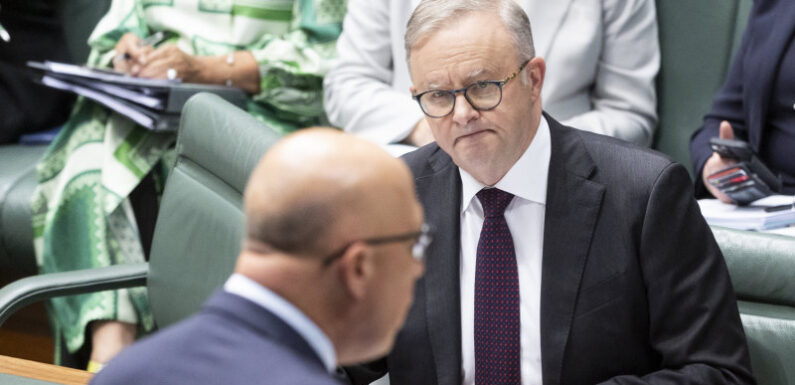
Save articles for later
Add articles to your saved list and come back to them any time.
Some of the most violent offenders released from immigration detention after a landmark High Court ruling could be put back behind bars under laws similar to those used to deal with terrorists that are being considered by the Albanese government.
The federal government has sought legal advice on the prospect of using preventative detention-style laws to re-detain non-citizens who had served jail time for offences such as rape and murder, according to two sources speaking anonymously to detail confidential information.
Prime Minister Anthony Albanese on Monday deflected a question about whether the government was considering preventative-detention measure.Credit: Alex Ellinghausen
It is one of a range of options Labor is considering to lower the risk posed by the worst offenders among the 93 people released so far.
The group, whose numbers are expected to grow in the coming weeks, was held in indefinite immigration detention as they could not be deported but had failed the government’s character test.
The nation’s most powerful court earlier this month ruled indefinite immigration detention was illegal, creating a political storm for Labor as dozens of former criminals were suddenly let go.
Labor and the Coalition joined forces last week to pass a law placing onerous restrictions on the group such as ankle bracelets and curfews – which human rights lawyers may challenge – and Home Affairs Minister Clare O’Neil on Monday flagged further restrictions.
The sources said the government had not yet settled on the preventative detention option or any similar arrangement. It was seeking to learn if it was on solid legal ground to enact new rules before the High Court published the full reasons for its decision next year.
Countering a week of intense criticism about the speed and force of his government’s response to the court decision, Prime Minister Anthony Albanese insisted Labor was prepared for the fallout and backed the performances of O’Neil and Immigration Minister Andrew Giles.
Albanese on Monday deflected a question about whether the government was considering preventative-detention measures, instead emphasising the importance of reading the court’s detailed reasons for a historic judgment that upended decades of immigration detention policy.
“We are doing all that we need to do, everything within our power, to keep people safe. That’s our first, second and third priority,” Albanese said on Sky News.
“What we’ve done is deal with what is an unfortunate position. It’s not one that we wanted. We didn’t make the decision to release these people.”
Coalition home affairs spokesman James Paterson on Sunday failed to back his leader, Peter Dutton, who has called for all members of the cohort, some of whom did not commit serious crimes, to be re-detained.
He instead called for a more targeted response involving “preventive detention, continuing detention and control orders [to] be applied at the very least to the higher risk offenders”.
Paterson said on Monday the government should pass the preventative measures in parliament next week, as it was “the only way to guarantee the community’s safety when it comes to the highest risk offenders in the cohort”.
The current preventative detention regime allows for the continued imprisonment of terrorist offenders still considered a risk after their prison terms expire. A court must deem this acceptable for it to be applied to any individual.
In March, Australia’s Independent National Security Legislation Monitor, Grant Donaldson, called for the abolition of preventative detention powers.
“These laws have made us a coarser and harsher society. I doubt that anyone knows whether they have made us safer,” Donaldson said at the time. “Whatever history truly tells us, and whatever international practice may teach us, orders of this kind are extraordinary.”
O’Neil said if she had the legal power, the released cohort would still be in detention, foreshadowing further measures could be implemented once the High Court delivered its reasons.
“We have established a new regime of community protections for people who have had to be released from detention,” O’Neil told a press conference at Parliament House on Monday.
“We will need to make refinements to that scheme as we go, and when we receive the High Court’s … reasons for the decision, we will be able to look at the longer-term repercussions of this.”
Constitutional expert George Williams said even in the terrorism context, preventative detention had been shown to be of questionable value.
“This is an unwieldy, ineffective means of community protection that has been criticised in official reports,” Williams said.
“It’s not clear the Commonwealth can do this, it may require state legislation. I thought it wasn’t likely the current measures would be struck down by the High Court, but gee, this would get you closer.”
Cut through the noise of federal politics with news, views and expert analysis from Jacqueline Maley. Subscribers can sign up to our weekly Inside Politics newsletter here.
Most Viewed in Politics
From our partners
Source: Read Full Article
